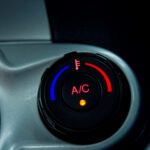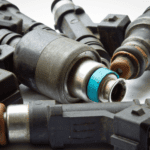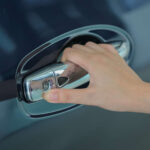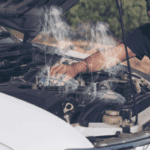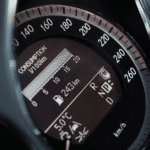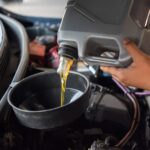Have you ever turned on your car’s AC to be met with an ear-piercing squealing noise? This annoying noise can indicate a problem with your car’s AC system.
A worn-out or damaged serpentine belt is one of the most common reasons for AC squealing. The belt drives the AC compressor; if it’s loose, damaged, or stretched, it can cause the AC to squeal. However, there are many other reasons for Air Con to squeal when switched on, which I’ve included in this article.
Common Causes of AC Squealing
If you’re hearing a high-pitched squealing noise when you turn on your car’s AC, there’s likely an issue with the system. Here are some of the most common causes of AC squealing:
Worn serpentine belt
The serpentine belt powers multiple components in your car: the alternator, power steering pump, and the AC compressor. There are a few reasons why the serpentine belt can cause a squealing noise when the AC is on. Although cars have a tensioner to keep the belt tight on the pulleys, once that tensioner has reached its limit, it continues to stretch. When the AC compressor engages the pulley, the extra pressure on the belt causes it to slip on the pulley, creating a horrible screeching noise.
Another reason the belt may screech is wear and tear. The belt can become worn and cracked, slipping on the pulley. When this happens, you may hear a loud squealing noise from the engine compartment. If you notice any signs of wear on your serpentine belt, replacing it will often cure the problem with no further repairs.
Faulty AC compressor clutch
The AC compressor clutch is responsible for engaging and disengaging the pulley with the compressor. If the clutch is faulty, it won’t engage correctly, which can cause the compressor to make a loud squealing noise. If you notice that your car’s AC turns on and off as it should, but you don’t feel the revs jump when the compressor clutch engages, it could be a sign of a failed compressor clutch. This indicates that the clutch is not working or not properly engaging with the pulley. By looking at the pulley, you can also tell if the compressor clutch is failing; you may notice the pulley and compressor engagement mechanism slipping.
As the compressor, the clutch, and the pulley are often supplied as one unit, solving this issue involves replacing the whole compressor unit.
Loose pulley
Although I have only seen this once, the pulley that drives the compressor is secured with a bolt going into the compressor. If the pulley is not correctly secured, you can visibly see it wobbling rather than spinning straight. When loose, the serpentine belt is catching on the edge of the pulley, creating a squeaking noise. Also, the pulley can rub on the securing bolt again, causing a squeaking noise.
Tightening the pulley securing bolt may be possible to solve the issue. However, if that is damaged, you may need to replace the whole compressor and pulley assembly.
Insufficient lubrication
Not many people know this, but when your car’s AC is regassed, a specific amount of special oil is also put in at the same time, which lubricates the compressor. If there wasn’t enough lubrication or the system leaked (more likely), the oil could no longer provide the compressor with the correct lubrication. Often, when this is the case, you will hear a tapping noise inside the compressor when the AC is switched on; this is the friction being created from the dry components rubbing together; you may also hear a faint squeaking noise for the same reasons.
It is always worth regassing the air conditioner and ensuring oil is put into the system to see if it rectifies the issue; this won’t cure itself overnight and may involve running the AC for a few hours before the squeaking disappears. Replacing the compressor is the only way to solve the issue if it doesn’t.
Blower motor failure
The blower motor is a fan designed to suck fresh air in from the outside and push it through the vents after the AC system has cooled it. If the blower motor fails, you may notice a decrease in the air coming through the vents and hear a faint squeal or rattling noise from behind the dashboard. The same symptoms will be present when the blowers are switched, regardless of whether it’s set to hot or cold or the AC is switched on or off.
Replacing a failed blower motor requires removing the dashboard in most vehicles; this is a time-consuming job that is best left to a mechanic. There are multiple electrical components and wiring behind them, and if you accidentally pull one out of connection, it can leave you with the enormous task of finding which wire was pulled out.
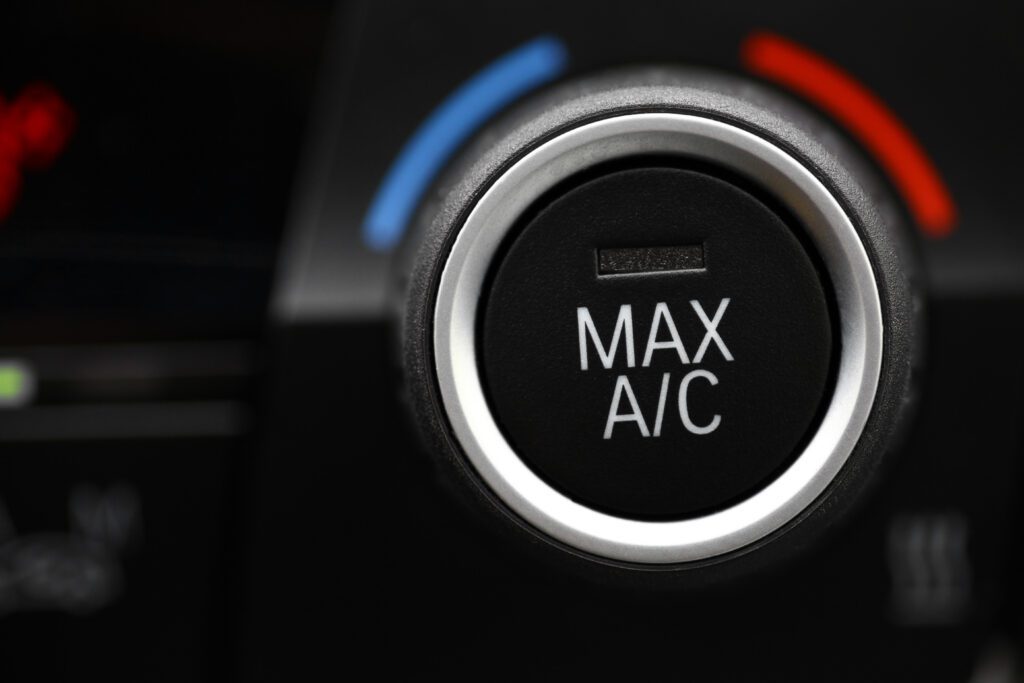
Diagnosing the Squeal
When diagnosing which component in the AC is causing an issue, you often just need to have the car running with the AC on and then use your senses to determine which component is squeaky. Here’s the approach I usually take to finding the cause:
- Listen to the blower motor – With the AC on or off and the blowers on full, listen for any signs that the blower motor behind the dashboard has failed.
- Check the AC belt – Check the belt for signs of wear, cracks, or fraying. If it feels loose, adjust the tensioner; if it’s adjusted to its maximum, replace it.
- Inspect the AC compressor – Listen closely for any squeaks from the air-con compressor. You should also check the compressor for any signs of damage or leaks.
- Check the AC clutch – Check the clutch is operating; it should click in and out when the AC is on. You can visibly see this operation.
- Check that the AC pulley is secure – Look for any signs that the AC pulley is loose or damaged. With the AC operating, it should not be visibly shaking around.
Repairing the fault
After following the steps to diagnose the issue, you must not attempt any repairs or replacements until the AC system is completely drained of refrigerant. To do this, a special machine is used to ensure that the gas does not escape into the atmosphere. Most car AC systems use R-134a refrigerant, a hydrofluorocarbon (HFC) that can deplete the ozone layer and contribute to greenhouse gases. Therefore, I recommended that a mechanic with the correct tools perform the repairs.
Once the repairs have been completed, the AC system will need to be regassed. One last tip that a lot of people miss is that if you have replaced the AC compressor, the clutch will not engage until the AC system has the correct amount of refrigerant. This is because there is a pressure switch that prevents the clutch from working until the system is properly charged.
Is It Safe to Drive With AC Squealing?
The short answer is no, but it is possible in certain instances. While a squealing noise might not seem significant, it could indicate a severe problem with the serpentine belt or a pulley problem. If the belt breaks or the pulley comes off, the car will shut off and won’t restart. This could be very dangerous depending on the road and speeds you’re driving.
There are instances where you could drive, for example, if a faulty blower motor causes the squealing noise. If you keep the blowers switched off, there is no danger to worry about, and you can continue driving. However, you must keep the blowers off. A failed blower motor could catch fire if debris is caught inside, causing the failure.
Like most things that go wrong with a car, once you know what the issue is, you can decide if it’s safe to drive or whether you need to take some necessary precautions so that you can drive.
Frequently Asked Questions
What Should I Do if My Car’s Air Conditioner Starts Chirping When in Use?
If your air conditioning makes a noise only when switched on, turn it off. Do not turn it back on until you can diagnose the cause of the problem. If they get worse, some of the possible causes could make the car shut off.
Could a Squealing Car AC Indicate a Problem With the Compressor, Even When It’s Off?
Yes, a squealing car AC can indicate a problem with the compressor, even when it’s off. The squeaking could be caused by a faulty compressor clutch or a problem with the pulley, which can make noise even when the compressor is not engaged.
Final Words
If you’ve ever heard a high-pitched squealing noise when you turn on your car’s AC, there is definitely an issue. An old, dry, or stretched serpentine belt is one of the most common reasons for AC squeaking, but there are many other reasons as well. These include faulty AC compressor clutch, loose pulley, insufficient lubrication in the compressor, and blower motor failure. Mechanics have no special tricks to diagnose which AC component is causing the issue; we just turn the AC on and use our senses to pinpoint the problem.
